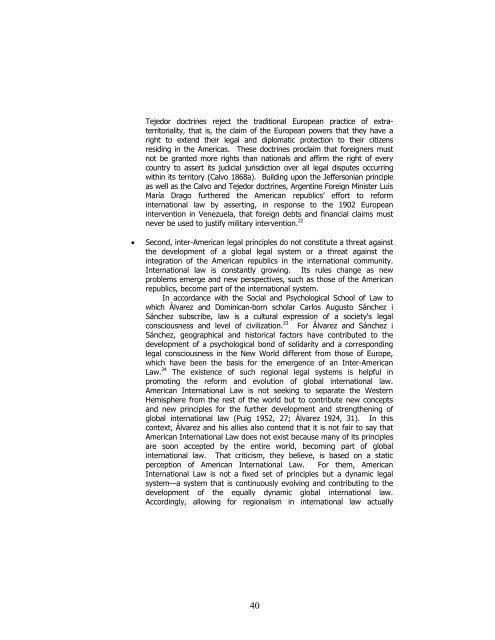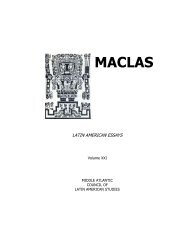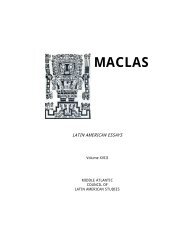latin american essays maclas
latin american essays maclas
latin american essays maclas
Create successful ePaper yourself
Turn your PDF publications into a flip-book with our unique Google optimized e-Paper software.
Tejedor doctrines reject the traditional European practice of extraterritoriality,<br />
that is, the claim of the European powers that they have a<br />
right to extend their legal and diplomatic protection to their citizens<br />
residing in the Americas. These doctrines proclaim that foreigners must<br />
not be granted more rights than nationals and affirm the right of every<br />
country to assert its judicial jurisdiction over all legal disputes occurring<br />
within its territory (Calvo 1868a). Building upon the Jeffersonian principle<br />
as well as the Calvo and Tejedor doctrines, Argentine Foreign Minister Luis<br />
María Drago furthered the American republics’ effort to reform<br />
international law by asserting, in response to the 1902 European<br />
intervention in Venezuela, that foreign debts and financial claims must<br />
never be used to justify military intervention. 22<br />
• Second, inter-American legal principles do not constitute a threat against<br />
the development of a global legal system or a threat against the<br />
integration of the American republics in the international community.<br />
International law is constantly growing. Its rules change as new<br />
problems emerge and new perspectives, such as those of the American<br />
republics, become part of the international system.<br />
In accordance with the Social and Psychological School of Law to<br />
which Álvarez and Dominican-born scholar Carlos Augusto Sánchez i<br />
Sánchez subscribe, law is a cultural expression of a society's legal<br />
consciousness and level of civilization. 23 For Álvarez and Sánchez i<br />
Sánchez, geographical and historical factors have contributed to the<br />
development of a psychological bond of solidarity and a corresponding<br />
legal consciousness in the New World different from those of Europe,<br />
which have been the basis for the emergence of an Inter-American<br />
Law. 24 The existence of such regional legal systems is helpful in<br />
promoting the reform and evolution of global international law.<br />
American International Law is not seeking to separate the Western<br />
Hemisphere from the rest of the world but to contribute new concepts<br />
and new principles for the further development and strengthening of<br />
global international law (Puig 1952, 27; Álvarez 1924, 31). In this<br />
context, Álvarez and his allies also contend that it is not fair to say that<br />
American International Law does not exist because many of its principles<br />
are soon accepted by the entire world, becoming part of global<br />
international law. That criticism, they believe, is based on a static<br />
perception of American International Law. For them, American<br />
International Law is not a fixed set of principles but a dynamic legal<br />
system—a system that is continuously evolving and contributing to the<br />
development of the equally dynamic global international law.<br />
Accordingly, allowing for regionalism in international law actually<br />
40




